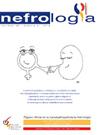COVID-19住院患者AKI后的长期结局
IF 2
4区 医学
Q2 UROLOGY & NEPHROLOGY
引用次数: 0
摘要
急性肾损伤(AKI)常见于住院患者,可导致不良的短期和长期预后。我们的目的是在一组COVID-19住院患者中评估AKI与长期肾脏不良事件和死亡率的关系。材料和方法对2020年3月至2020年10月期间在葡萄牙北里斯本中心医院Universitário COVID-19专用病房住院的患者进行单中心和回顾性研究。AKI的定义和分类是根据肾脏疾病:改善总体预后(KDIGO)分类,使用SCr标准。分析的结果是主要不良肾脏事件(MAKE)、主要不良肾脏心血管事件(MARCE)的发生和两年随访期间的死亡率。结果409例患者中,AKI发生率为60.4% (n = 247)。出院后2年内,31.8% (n = 130)的患者有eGFR和lt;60 mL/min/1.73 m2和/或25%的eGFR下降,1.7% (n = 7)的患者需要RRT, 6.1% (n = 25)的患者发生CV事件,27.9% (n = 114)的患者死亡。MAKE发生率为60.9% (n = 249), MARCE发生率为62.6% (n = 256)。在多因素分析中,年龄较大(调整后的危险比1.02 (95% CI: 1.01-1.04), p = 0.008),心血管疾病(调整后的危险比2.22 (95% CI: 1.24-3.95), p = 0.007),慢性肾脏疾病(调整后的危险比5.15 (95% CI: 2.22 - 11.93), p <;0.001)和AKI(调整后危险度1.76 (95% CI: 1.12-2.78), p = 0.015)是MAKE的独立预测因子。高龄(调整后HR 1.06 (95% CI: 1.04-1.08), p <;0.001)和肿瘤(校正后危险比4.88 (95% CI: 2.37-10.04), p <;0.001)是死亡率的独立预测因子。结论在这组住院的COVID-19患者中,AKI与出院后长期需要透析和/或肾功能下降和/或死亡的风险独立相关。本文章由计算机程序翻译,如有差异,请以英文原文为准。
Long-term outcomes after AKI in hospitalized patients with COVID-19
Introduction and objectives
Acute kidney injury (AKI) is frequent in hospitalized patients and contributes to adverse short- and long-term outcomes. We aimed to evaluate the association of AKI and long-term adverse renal events and mortality in a cohort of patients hospitalized with COVID-19.
Material and methods
Single-center and retrospective study of hospitalized patients admitted to a Dedicated Unit for COVID-19 at Centro Hospitalar Universitário Lisboa Norte, Portugal, between March 2020 and October 2020. AKI was defined and classified according to the Kidney Disease: Improving Global Outcomes (KDIGO) classification, using SCr criteria. The analyzed outcomes were development of major adverse kidney events (MAKE), major adverse renal cardiovascular events (MARCE), and mortality over a two-year follow-up period.
Results
From the included 409 patients, AKI occurred in 60.4% (n = 247). Within two years after discharge, 31.8% (n = 130) of patients had an eGFR < 60 mL/min/1.73 m2 and/or a 25% decrease on eGFR and 1.7% (n = 7) of patients required RRT, 6.1% (n = 25) of patients had CV events and 27.9% (n = 114) of patients died. The incidence of MAKE was 60.9% (n = 249), and MARCE was 62.6% (n = 256). On a multivariate analysis, older age (adjusted HR 1.02 (95% CI: 1.01–1.04), p = 0.008), cardiovascular disease (adjusted HR 2.22 (95% CI: 1.24–3.95), p = 0.007), chronic kidney disease (adjusted HR 5.15 (95% CI: 2.22–11.93), p < 0.001), and AKI (adjusted HR 1.76 (95% CI: 1.12–2.78), p = 0.015) were independent predictors of MAKE. Older age (adjusted HR 1.06 (95% CI: 1.04–1.08), p < 0.001) and neoplasia (adjusted HR 4.88 (95% CI: 2.37–10.04), p < 0.001) were independent predictors of mortality.
Conclusions
In this cohort of hospitalized patients with COVID-19, AKI was independently associated with the risk of long-term need for dialysis and/or renal function decline and/or mortality after hospital discharge.
求助全文
通过发布文献求助,成功后即可免费获取论文全文。
去求助
来源期刊

Nefrologia
医学-泌尿学与肾脏学
CiteScore
3.40
自引率
7.70%
发文量
148
审稿时长
47 days
期刊介绍:
Nefrología is the official publication of the Spanish Society of Nephrology. The Journal publishes articles on basic or clinical research relating to nephrology, arterial hypertension, dialysis and kidney transplants. It is governed by the peer review system and all original papers are subject to internal assessment and external reviews. The journal accepts submissions of articles in English and in Spanish languages.
 求助内容:
求助内容: 应助结果提醒方式:
应助结果提醒方式:


